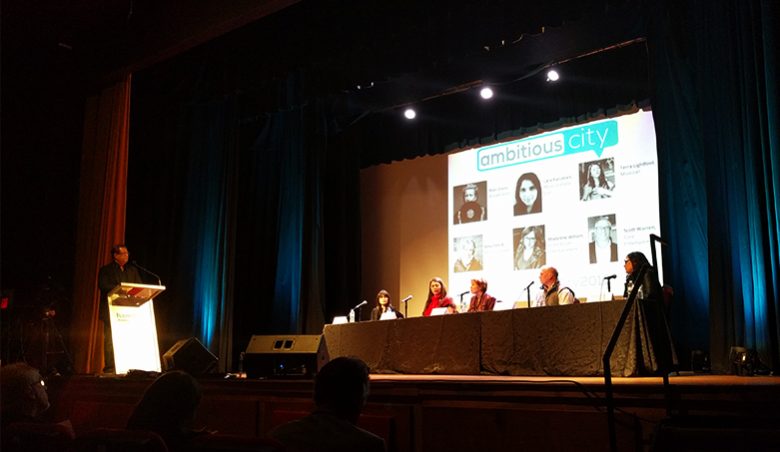
Ambitious City 2016: The Music City
- Olga Kwak
- 12 Dec 2016
Hamilton Can Become A Better Music City
By Getting Out Of Its Own Way
On an early November evening, members of Hamilton’s arts and business community met at the Lincoln Alexander Theatre to discuss Hamilton’s ambitions to be a better “music city”.
The fourth annual Ambitious City symposium was hosted by the Hamilton Chamber of Commerce to discuss the city’s strategies and ideas for moving forward on a particular theme gleaned from strategies identified by the city as being important to Hamilton’s progress. The evening began with a performance by Tom and Thomson Wilson, a spare, haunting collection of melodies that dug into Hamilton’s history as a folk-rock haven.
The performance was followed by a keynote speech by Graham Henderson, head of Music Canada and the Chair of the Ontario Chamber, who addressed the ways in which Hamilton’s goals to be a Music City have aligned with the trends in other municipalities, as well as the Music City Toolkit, a roadmap and guide for city chambers of commerce to help them harness the power of music as a source of economic development.
According to Mr. Henderson, Hamilton’s doing pretty well for itself.
Of the five roles that a chamber can take to build a music city, Hamilton’s taken on all of them in some way since music was identified as a key strategy for Hamilton’s economic development in 2014. From the creation of the Music and Film Office to incorporating music into Chamber events themselves, Hamilton’s business community has created opportunities to build that identity out.
Mr. Henderson’s speech was followed by a panel discussion of Hamilton music industry professionals moderated by music historian and legendary DJ Alan Cross. The panel included musician Terra Lightfoot, Amy Terrill, Executive Vice President of Music Canada; Madeline Wilson, Founder of Front Room Entertainment; Lara Farcasan, Networking and Outreach Manager of Music Canada Live; and Scott Warren, General Manager of Core Entertainment.
The discussion ranged from Hamilton’s identity to venue spaces, music education, tourism and public transit, which was identified as an important factor that draws musicians to live and work in a particular city.
Mr. Henderson was quick to point out that there’s a difference between a “musician-friendly” and a “music-friendly” city.
Affordable housing and transportation attracts more musicians to a city and as prices go up in Toronto, more and more musicians are looking for alternatives. Hamilton’s proximity and own culture and identity is becoming increasingly more attractive.
Hamilton can become a better music city by “getting out of its own way”, according to Madeline Wilson. This includes inviting more music into the city, working together to make sure that a venue crisis like the one currently plaguing Vancouver, wherein musicians are not finding good, small to medium-sized venues to perform in, doesn’t hit Hamilton, and, more broadly, we build a city that can support music and musicians themselves with affordable housing and good local transportation. The LRT will be a huge boost in that direction.
Earlier in the week, at another Chamber event, Chamber of Commerce President and CEO Keenan Loomis lamented the fact that Hamilton does not have “a champion” in city council yet who can help Hamilton become a better music city. This is a platform opportunity for anyone running in the 2018 city council election.
Given that Hamilton’s identity has shifted from manufacturing to culture, a city council that supports building Hamilton’s cultural identity and recognizes its power for economic development would truly make Hamilton an ambitious music city.
Comments 0
There are no comments




Add comment